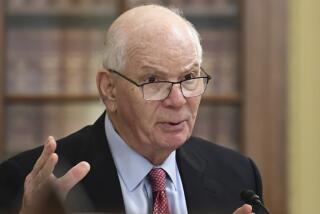Keep Revenue Sharing Alive, Panel Urges : Budget Unit Advises Extension as White House Bars Tax Hike
WASHINGTON — The Senate Budget Committee today recommended keeping revenue sharing alive for one more year, despite President Reagan’s call for ending the program that funnels $4.6 billion annually to cities and counties.
The 13-9 vote came as the Administration launched a preemptive strike against an expected move in the committee for higher taxes, with White House spokesman Larry Speakes saying Reagan is as “strong as 10 pounds of onions against it.”
“If I were a betting man I’d give you about 100 to 1 that he’d veto” a tax increase, Speakes added.
Reagan is against continuing the revenue-sharing program, but that made little difference in the Republican-controlled committee, which handed him another in a long string of defeats on domestic spending.
The plan agreed to, proposed by Sen. J. James Exon (D-Neb.), would maintain revenue sharing for local governments through the 1986 fiscal year and then allow it to end when its congressional authorization expires at the end of that year.
Year ‘to Get House in Order’
With counties and cities depending on the money, Exon said, Congress should give them a year “to get their house in order” before the funding is cut off.
Even Sen. Pete V. Domenici (R-N.M.), who as committee chairman has argued for almost all of Reagan’s domestic spending cuts, supported Exon. “It sends a signal that we’re going to get rid of revenue sharing and gives them a year to get ready,” he said.
As the committee met for the first time since last week, aides said spending decisions made so far would save $11.3 billion from domestic programs in the 1986 fiscal year, on top of a recommended $21.1-billion reduction in the Administration’s defense buildup. That meant the panel had rejected $21.1 billion in domestic cuts Reagan wants.
The committee’s pattern last week was to generally freeze spending on domestic programs next year. That meant defeat after defeat for Reagan’s proposals to end federal programs such as Job Corps and urban mass transit assistance, and to cut deeply into others, such as the Guaranteed Student Loan program.
Without any changes, the deficit is expected to rise above $230 billion next year.
Spending, Revenue Targets
The Budget Committee is at work on spending and revenue targets to guide the Congress through the coming year on budget matters and has no power to produce legislation that would raise taxes.
But with several Democrats and at least one Republican on the panel calling for higher taxes to reduce the deficit, Speakes’ comments amounted to a preemptive strike by the Administration against any move in that direction.
“The committee should forget taxes as an answer to the deficit and get down to business cutting spending,” he told reporters.
Reagan “doesn’t like new corporate taxes, he doesn’t like taxes on the oil industry, he doesn’t like consumer taxes, he doesn’t like--what else is there--he doesn’t like individual taxes. . . . All of that he doesn’t like,” Speakes said.
More to Read
Get the L.A. Times Politics newsletter
Deeply reported insights into legislation, politics and policy from Sacramento, Washington and beyond. In your inbox three times per week.
You may occasionally receive promotional content from the Los Angeles Times.










